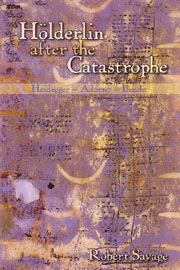Book contents
2 - Polemic: Adorno, “Parataxis”
Published online by Cambridge University Press: 05 February 2013
Summary
Doch als sich ihre Gewande berührt,
Und keiner vernehmen konnte
Die eigene Rede des andern, wäre wohl
Entstanden ein Zwist, wenn nicht aus Zweigen herunter
Gekommen wäre die Kühlung.
[But when their garments had touched
And none could comprehend
The other's peculiar speech, a quarrel
Might well have begun, if coolness had not fallen
Upon them from the boughs.]
— Hölderlin, “Die Wanderung” (The Journey)THEODOR W. ADORNO'S SPEECH had been announced under the title “Parataxis: Zur philosophischen Interpretation der späten Lyrik Hölderlins” (Parataxis. On the Philosophical Interpretation of Hölderlin's Late Poetry). The renowned social theorist was scheduled to deliver the keynote address at the 1963 convention of the Hölderlin Society, held for the first time in a divided Berlin, before an audience that included some of the finest literary critics in the German-speaking world. Although Adorno was not known as a Hölderlin specialist, it was hoped that he might be able to open up a fresh perspective on familiar terrain, to illuminate some of those aspects of the poet's work that tended otherwise to escape the philologist's blinkered gaze. Similar considerations had motivated the Society to invite Martin Heidegger, likewise something of an outsider in relation to the guild, to address the convention four years earlier; and while the resulting meditation on “Hölderlins Erde und Himmel” (Hölderlin's Earth and Sky) had not been to everyone's taste, it was generally agreed that the establishment of lines of communication between the narrow circle of Hölderlin scholarship and the most influential philosophical movements of the day could only further the society's goal of awakening the interest of a broader public in the poet in whose service it stood.
- Type
- Chapter
- Information
- Hölderlin after the CatastropheHeidegger - Adorno - Brecht, pp. 96 - 149Publisher: Boydell & BrewerPrint publication year: 2008



